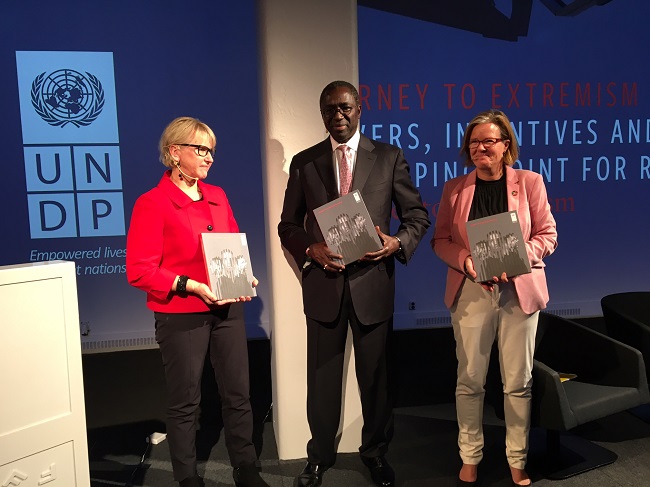Sweden’s foreign minister speaks about extremism

From l. to r.: Ms. Margot Wallström, Foreign Minister of Sweden, UN Assistant Secretary-General, UNDP Assistant Administrator and Regional Director for Africa Abdoulaye Mar Dieye, and SIDA Director Ms. Carin Jämtin. Photo: UNDP Sweden
Let me first extend a warm welcome to the launch of the UNDP study “Journey to Extremism in Africa: Drivers, Incentives and the Tipping Point for Recruitment”. It is a great privilege and honour to host the launch of such an important and timely report here in Stockholm.
I would especially like to thank Fotografiska for hosting this event and the accompanying photo exhibition as well as the UNDP for their tireless work for global development. It is encouraging to see such broad participation and engagement in what amounts to one of the great threats to peace, security and development today: violent extremism.
As we are all unfortunately aware, terrorism continues to cause suffering, fear and disruption across the globe. Indeed, we suffered an attack here in Stockholm only a few months ago, in which five people were killed and 15 people injured. In other parts of the world, far greater numbers are victims of extremist groups such as Daesh, Boko Haram and al-Shabab as they continue to commit heinous crimes and serious abuses and violations of human rights, including sexual enslavement, child and forced marriages and denials of girls´ and women´s enjoyment of the right to education.
We need to do everything we can to put an end to the horrors of terrorism. Terrorism threatens the very foundation of peaceful, democratic and open societies.
I would like to emphasize three areas that are central in the fight against extremism.
First, a comprehensive and sustainable approach to countering terrorism and preventing violent extremism must include a broad range of measures and perspectives. While we must continue to take measures that enhance security, it is essential not to overlook the importance of tackling the root causes to terrorism and ensuring respect for human rights and the rule of law.
Violent extremism is often inspired by a global agenda but rooted in local discontent. Injustices and deprivation of rights and dignity can nurture recruitment to extremist violent groups. Only through strengthening societal inclusiveness, political participation and respect for human rights, can we successfully prevent violent extremism and counter terrorism. A carefully designed gender-perspective is also needed, taking into account the different perspectives of men and women and girls and boys are crucial to creating lasting results.
Secondly, I would like to point out the close relationship between development and violent extremism. Violent extremism has devastating consequences not only for those who are directly affected by it, but also for the development gains which have been made in recent decades. Terrorism breeds instability and division, which in turn generate poverty, lack of economic opportunity, forced migration, organized crime and breeding grounds for further radicalization.
The most sustainable way to fight this radicalization is through long-term efforts like the ones found in the 2030 Agenda for sustainable development.
This brings me to my third point: the importance of research. This UNDP study makes a significant contribution to the understanding of the drivers of violent extremism, in Africa and beyond.
The more we learn about the drivers and root causes of radicalization, the more we understand the importance of individual and local circumstances. It is only with a solid grasp of these underlying factors and circumstances that we can effectively and sustainably counter and prevent that which motivates individuals and groups to commit acts of violence. Finally, I would like to say a few words about the particular geographical context of this study. Due to the unique ethnic and religious configuration of many African states and the transnational nature of terrorism, broad regional approaches are necessary. This includes working through regional fora and multilateral institutions. The African Union is an important partner in countering terrorism and preventing radical extremism.
We need to work with African partners in a bilateral and multilateral setting against violent extremism and the rise of radicalisation. Civil society and international organizations also have an important role to play. Indeed, the UNDP Africa program ‘Preventing and Responding to Violent Extremism in Africa: A Development Approach’ is a good example of how development can be directly linked to measures against the root causes of radicalisation and violent extremism.
I would once again like to extend my thanks to the UNDP for their work. It is only with a solid understanding of the underlying causes, drivers and motivations of violent extremism that effective approaches can be designed.
Thank you.
This speech was delivered on September 11 at the launch of the UNDP report in Stockholm
Swedish Government

